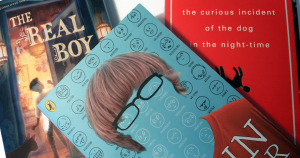Seeking Contributors
Although we have a fantastic line-up for the upcoming event already, we’re still happy to welcome new contributors.
Although we have a fantastic line-up for the upcoming event already, we’re still happy to welcome new contributors.
Background, details, and other information regarding our upcoming “Autism on the Page” event.

Speculative fiction is work that focuses on difference, work that immerses us in it. But the choices we make when building a fictional world can reflect on the world that we live in now. So how do we worldbuild with disability in mind?

The description for this book uses the phrase “brilliant but autistic” to describe its main character, and that’s where our conflicted feelings about Viral Nation start.

We take a close look at the state of recognizable representation of visibly disabled characters on book covers.

That’s the thing about disability, I think. You’re a normal person, you experience normal things, and then, every once in a while, you hit that wall. That reminder that you aren’t quite like the majority of your peers.

When privileged outsiders define us, they often do so out of ignorance, self-interest, or malice, and their versions of ourselves, rather than our own realities, become the norm.

An estimated 1 in 7 women suffer from chronic pelvic pain; it’s bizarre and disappointing that despite these statistics, there are distinctly zero characters with this condition.

As much as I crave representation in fiction, it bothers me that some people seem to see autism as a way to create conflict or add a unique viewpoint to a narrative. It is even more disturbing when so many of these portrayals are inaccurate or incomplete.

Here is a key insight to creating realistic autistic characters: We do not do the visibly autistic things we do because of “autism,” full stop. Like non-autistic people, we are responding to our experiences of the world. Those experiences simply differ from those of non-autistic people.